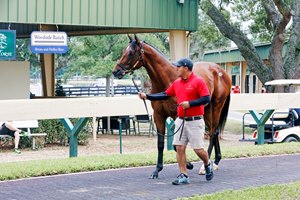Trainers Want HISA Oversight of Breezes at Auctions


During a Horseracing Integrity and Safety Authority town hall meeting March 11, trainers Ron Moquett and Dale Romans strongly urged that Thoroughbreds at sales should be regulated by HISA—just as they are in the racing environment.
Moquett and Romans serve on HISA's Horsemen's Advisory Group.
"One of the things that I always thought was odd is that the way it is currently we don't care about the horse in April when it's galloping out in :32-and-change or :33 in Ocala, but all of a sudden, in May we care when it's breezing :39 or :38 at Churchill Downs,'' said Moquett.
"I think it's somewhat hypocritical to say that we're there for the integrity of the sport, whenever the product of the sport is based on the health of these animals and so much can be done good and bad. ... The fact that we don't regulate (sales works) in some form or fashion, it's kind of hypocritical to the rest of the world that we really care about these athletes' health, because we only care about them if we can bet on them."
Added Romans, "I don't understand why the sales companies aren't held at the same standard as we are and I think that they should offer hair samples for every horse that breezes. If I purchase a horse, they should offer the test and we can pluck the hairs and see what's in that horse going forward."

Moquett noted that regulating sales would be a new challenge for HISA that would have it "looking into a lot of places you've never looked."
Romans said, "That's a Pandora's box that needs to be opened, should have been opened a long time ago."
HISA CEO Lisa Lazarus, who moderated the discussion, noted that currently a horse is not covered by HISA until it has an official work that is recorded by Equibase. She added that she met with Keeneland, Fasig-Tipton, and Ocala Breeders Sales Company in October and they "agreed to work together to come up with an anti-doping program that aligned with HISA so that there's a sensible journey from weanling, yearling, 2-year-old, and then into horses of racing age."
Other topics discussed
- Lazarus said a new approach going forward is if a horse tests positive based on a hair sample as opposed to blood or urine, "We aren't going to make it public until such time as a segmented analysis takes place."
- A question was asked about whether it was better to have one lab handle all of the sample testing rather than the multiple facilities used currently. Lazarus said that while the number of labs used is down to five because the lab at the University of Kentucky currently is not part of the program, the results are consistent. She said there are more than 100,000 samples processed each year but wouldn't mind a reduction in labs. "Based on volume, if we can get down to three or so labs, I think that probably would be preferable because you just have more and more consistency."
- She noted the five labs meet weekly and it is better than the state system, which allows states to put forth their lab of choice, but if the lab does not meet the standards expected by HISA and the Horseracing Integrity and Welfare Unit, it will not be accepted.
- Another question posed to Lazarus focused on how HISA and HIWU stay current on drugs tested for. Lazarus noted the Anti-Doping and Medication Control policy has not even been in place for a year, but that HIWU is always considering new information. This can be done with write-in suggestions on whether a substance should be banned or not, monitoring of other racing jurisdictions for new developments, communication between labs, and a more official annual review that includes discussing whether substances need to be moved from one category to another.
- A hot-button topic has been the ability for covered persons to afford legal aid in the event they allegedly are involved with a positive test. Lazarus mentioned the pro bono counsel that is available for trainers who want a lawyer but cannot afford one. She said no one to date has been denied that service.
- Moquett offered advice to horsemen who find themselves having to address concerns of a possible violation. "If you have a positive, one of the things that I have now learned, it's very, very important that you address the definition of how you think you got there with HIWU," Moquett said. "Whenever they ask you the question, before you get mad and start throwing stuff, the first thing you got to write is the truth as you saw it."
